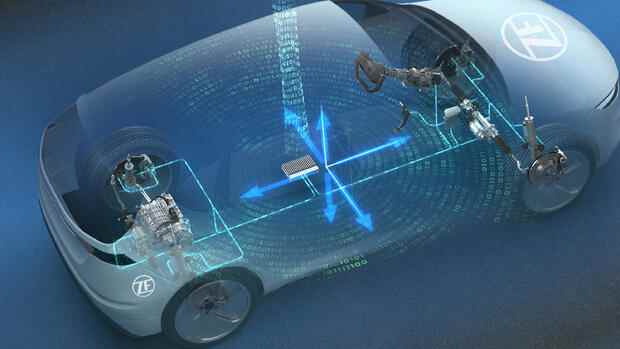Electronic steering transmits the steering commands via signal.
(Photo: ZF)
Stuttgart, Dusseldorf It’s a sensitive topic: In the future, car steering wheels will no longer be mechanically connected to the front wheels. Airplane pilots once found it difficult to reconcile the fact that with “Fly-by-Wire” they were no longer physically connected to their take-off and landing flaps and tail rudder. In the car, too, the steering wheel will soon only be connected electronically.
The second-largest German supplier, ZF, is now showing itself to be particularly courageous in the highly competitive field of electronic steering control and is pushing ahead with the new “steer-by-wire system” for passenger cars at a technology demonstration in Hanover.
ZF CEO Wolf-Henning Scheider said: “In a highly competitive environment, ZF holds a top position because we are offering a holistic by-wire vehicle control for the first time.” It should be usable in passenger cars and commercial vehicles and can be updated “over-the-air” without having to visit a workshop.
Scheider expects that by-wire technology will play an increasingly important role in all aspects of vehicle motion control in the future. ZF has already received several volume orders from international vehicle manufacturers for its new steer-by-wire system. US automakers are among the first customers.
Top jobs of the day
Find the best jobs now and
be notified by email.
Since there is no mechanical steering rod in steer-by-wire steering, the system must be set up redundantly. Several fail-safe devices for the processors and an emergency power supply are intended to prevent the steering system from failing.
The electronic steering also enables new interior design options. For example, if vehicles are to drive themselves in the future, the steering wheel in the interior can be retracted and no longer takes up any space. For suppliers who have big ambitions in the field of automated driving, electronic steering is an important business area.
Tough competition among suppliers
All major automotive suppliers are therefore currently working on steer-by-wire solutions. While ZF has set up its own development, Bosch and Continental have set up joint ventures for this purpose. In turn, Schaeffler took over the steering specialist Paravan in 2018.
The outgoing ZF boss wants to put the supplier in a leading position in electronic steering.
(Photo: Martin Leissl/laif)
Another benefit of electronic steering is the ability to massively change the steering characteristics. If desired, the number of steering locks can be reduced. The steering can even be set so directly that there is no need to reach over on sharp bends or when manoeuvring. Significantly fewer steering movements would be necessary, and the comfort for the driver would increase, especially when parking and turning. “Up to 75 degrees are possible with our new front axle. That corresponds to almost parallel parking,” says ZF Steering Manager Manfred Meyer.
ZF has a lot of experience with this topic. Seven years ago, Porsche was the launch customer for the steerable rear axle, which was already electronically controlled. The fact that it took so long before the electronic steering could also be used in the front axle is due to the complexity: “The front axle is the supreme discipline,” says Meyer. In the event of a system failure, the rear axle can simply be set to neutral, and it then behaves like an unsteered rear axle. This is not possible with the front axle in a curve.
Difficult development, expensive for customers
Some manufacturers have had a hard time nibbling on the development of the electronically steered front axle. The technology was initially error-prone. Nissan’s luxury brand Infiniti had to experience this painfully in the USA. The car manufacturer was one of the first car manufacturers to offer steer-by-wire steering there back in 2012.
But as early as 2013, the Japanese car manufacturer had to recall vehicles in the USA because the fully electronic steering failed in cold temperatures. And the systems are expensive. In the new electric model from Lexus, customers have to pay a surcharge of 3500 euros for electric steering.
In Germany, Continental is working with the Chinese-American supplier Nexteer in the field of electronic steering. In 2017, Continental founded a joint venture with Nexteer for this purpose. Nexteer specializes in the development of steering systems. The company was formerly part of the US car manufacturer General Motors and the supplier Delphi, which has now been taken over by Borg Warner. In 2010 Nexteer was taken over by the Chinese Pacific Century Motors.
Among other things, the joint venture is also developing a so-called “brake-to-steer” steering system. “As a so-called fallback solution, the function intervenes in the event of a steering failure by steering the vehicle through targeted braking interventions on individual wheels,” reports Continental. One field of application for this solution is highly automated driving above level 3, in which vehicles can drive independently on the freeway. The automotive supplier does not provide any information on customers and development costs.
The business is highly competitive. From financial circles it is said that steer-by-wire is the new trend in the steering business and that the large German suppliers are well positioned there. But the profits were still limited. This is one of the reasons why Bosch has brought a partner on board through a joint venture, whose name the Swabians do not name. “In 2025 we will be on the market with a mass-market platform system,” said a company spokeswoman. ZF is expected to be on the market two years earlier.
Schaeffler, on the other hand, is currently testing the system of the acquired competitor Paravan in the German racing series DTM. Former Formula 1 driver Nico Rosberg also tested the Schaeffler Paravan steering system at the Nürburgring.
More: Schaeffler wants to get into the top three in electromobility. But competitors like Bosch are already way ahead when it comes to orders.
